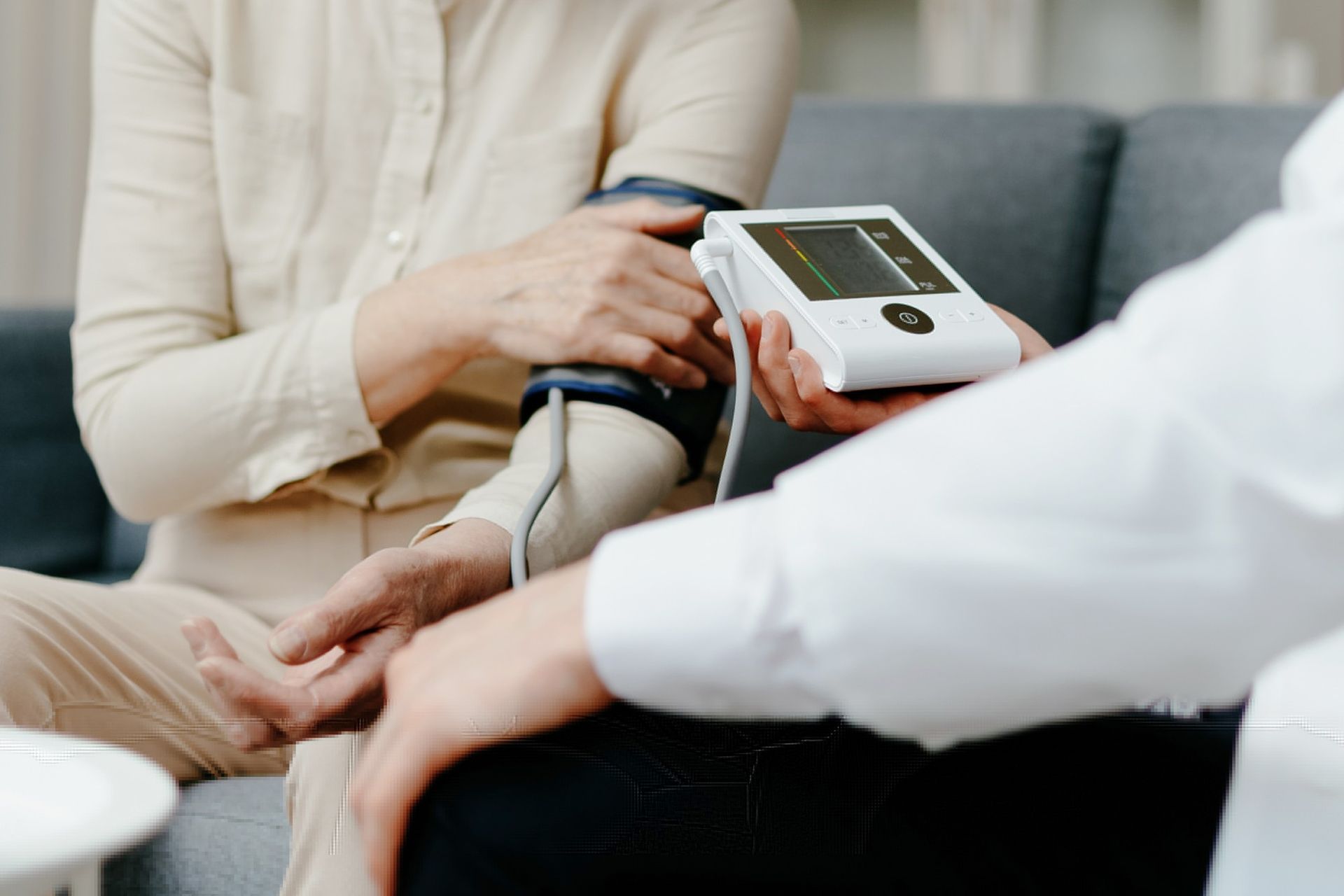Have you noticed anything unusual lately, like your heart racing for no reason, difficulty sleeping, or unexplained weight loss? While it's easy to attribute this to stress, these could be
early signs of hyperthyroidism.
The thyroid, a small butterfly-shaped gland in your neck, regulates metabolism, the process of converting food into energy. When overactive thyroid symptoms develop, your metabolism speeds up, affecting everything from your heart and digestion to your mood and sleep patterns.
You may brush off the racing heart as anxiety, the sweating as just a hot day, or the weight loss as a welcome change. But if left untreated, hyperthyroidism can lead to serious health complications, including heart issues, brittle bones, and chronic fatigue.
In this blog, we’ll walk you through hyperthyroidism symptoms, what causes them, and the treatment options available.
Noticing Symptoms of an Overactive Thyroid?
What Is Hyperthyroidism?
Hyperthyroidism or an overactive thyroid happens when the thyroid gland releases excessive amounts of the hormones triiodothyronine (T3) and thyroxine (T4). These hormones control the way your body turns food into energy, and when they exceed normal levels, your body’s metabolism speeds up, causing it to work in overdrive.
It’s important to note that
hyperthyroidism is not caused by stress. While stress can affect the body in similar ways, hyperthyroidism is due to hormone imbalances that disrupt metabolism, leading to symptoms like weight loss, fatigue, heart problems, and weakened bones.
Who Is at Higher Risk for Developing Hyperthyroidism?
- Women (especially those between ages 20–40)
- Individuals with a family history of thyroid disease
- People with autoimmune disorders such as Graves' disease
- Those with high iodine intake or on thyroid medication
Common Overactive Thyroid Symptoms
Recognizing the early signs of hyperthyroidism can help prevent complications. Below are some of the most common symptoms to watch for.
- Weight loss despite increased appetite
- Rapid or irregular heartbeat (palpitations)
- Anxiety, nervousness, or irritability
- Sweating and heat intolerance
- Tremors or shaky hands
- Increased bowel movements or diarrhea
- Thinning hair or noticeable hair loss
- Bulging eyes (specific to Graves’ disease)
If you’re experiencing any combination of these
hyperthyroidism symptoms, it’s time to consult a healthcare provider.
Houston Family Practice offers comprehensive evaluations to help you understand your symptoms and take the best steps to successful treatment.
What Causes Hyperthyroidism?
Several factors can lead to an overactive thyroid. The most
common causes of hyperthyroidism include:
- Graves' Disease – An autoimmune disorder that causes the immune system to attack the thyroid, leading to excessive hormone production.
- Thyroid Nodules – Overactive lumps or growths in the thyroid that produce excess hormones.
- Thyroiditis – Inflammation of the thyroid that causes hormone leakage into the bloodstream, leading to temporary hyperthyroidism.
- Excess Iodine Intake – High iodine levels from food, supplements, or imaging tests can trigger hormone overproduction.
- Overmedication – Taking too much synthetic thyroid hormone (e.g., levothyroxine) for hypothyroidism can cause hyperthyroidism symptoms.
How Is an Overactive Thyroid Diagnosed?
To confirm a hyperthyroidism diagnosis, doctors generally use:
- Blood Tests: Measures TSH, T3, and T4 levels. Low TSH with high T3/T4 confirms hyperthyroidism.
- Radioactive Iodine Uptake Test: Assesses how much iodine your thyroid absorbs, indicating thyroid function.
- Thyroid Ultrasound: Visualizes the thyroid to detect nodules, inflammation, or enlargement.
At
Houston Family Practice, we perform thorough testing and provide expert guidance to ensure an accurate diagnosis and clear treatment plan.
Hyperthyroidism Treatment Options
Once diagnosed, your doctor will prepare the best treatment plan for you. The primary options for treating hyperthyroidism include:
Medications
- Antithyroid Drugs (Methimazole, PTU): These medications reduce hormone production, helping bring hormone levels back to normal.
- Beta-blockers: These do not reduce hormone levels, but they are helpful in managing symptoms like rapid heart rate, tremors, and anxiety.
Radioactive Iodine Therapy
This non-invasive hyperthyroidism treatment involves taking radioactive iodine orally, which gets absorbed by the thyroid and gradually reduces hormone production. It
often leads to hypothyroidism, which can be managed with thyroid hormone replacement therapy.
Thyroid Surgery (Thyroidectomy)
Surgery may be necessary if other treatments fail or if there are large goiters or problematic nodules. This involves removing part or all of the thyroid gland, with most patients requiring hormone replacement therapy afterward.
Lifestyle Tips for Managing an Overactive Thyroid
In addition to medical treatment, certain lifestyle changes can make living with hyperthyroidism more manageable:
- Dietary Adjustments:
Limit foods high in iodine, such as seaweed, shellfish, and iodized salt.
- Stress Management:
Practice yoga, meditation, or breathing exercises to help regulate stress and anxiety.
- Regular Check-ups:
Routine blood work and doctor visits help ensure your thyroid levels stay balanced.
Hyperthyroidism vs. Hypothyroidism Comparison
Get the Support You Need for Hyperthyroidism at Houston Family Practice
Hyperthyroidism can escalate quickly if left untreated, leading to a thyroid storm, a rare but life-threatening condition. If you notice any warning signs like a rapid heartbeat, fever, confusion, or shortness of breath, seek immediate medical attention.
Suspecting an overactive thyroid? Book an appointment at
Houston Family Practice for expert care, diagnosis, and treatment options.
Concerned You Might Have Hyperthyroidism?
Frequently Asked Questions
Does Houston Family Practice diagnose and treat hyperthyroidism?
Yes, we provide comprehensive care for hyperthyroidism, offering expert diagnosis and treatment options tailored to your needs.
What diagnostic tests are available for hyperthyroidism at Houston Family Practice?
We provide thorough evaluations for thyroid concerns. While some specialized tests, like radioactive iodine uptake or thyroid ultrasounds, are not performed in-house, we can refer you to trusted facilities for these services.
Can Houston Family Practice manage my hyperthyroidism medication?
Yes, we manage thyroid medications and work with you on a personalized hyperthyroidism treatment plan to ensure effective care.
Does Houston Family Practice offer lifestyle counseling for hyperthyroidism management?
Yes, we offer lifestyle and dietary counseling as part of a holistic approach to managing overactive thyroid symptoms and improving overall health.
How can I schedule an appointment with Houston Family Practice?
You can schedule an appointment through our patient portal or by calling us at 713-520-6016.















